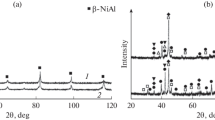Conclusions
-
1.
The ductile-to-brittle transition temperature of Mo+47% Re is considerably lower than that of molybdenum with the same carbon content. With 0.11% C the transition temperature of Mo+47% is −196 to −60°C, while that of molybdenum is −20 to +80°C.
-
2.
The alloy of Mo +47%+0.13 C is ductile at room temperature, and a strip 0.5 mm thick was produced from it.
-
3.
The high ductility of Mo +47% Re as compared with pure molybdenum (the so-called “rhenium effect’) is due to the higher solubility of carbon in molybdehum alloyed with rhenium. (The solubility of carbon is five times higher in this alloy.) This leads to a smaller amount and smaller size of carbide particles. Additions of rhenium also have a favorable effect on the composition of the carbides, their shape and distribution, and also exert a modifying influence.
Similar content being viewed by others
Literature cited
E. M. Savitskii and G. S. Burkhanov, Metal Science of Refractory Metals and Alloys [in Russian], Nauka, Moscow (1967).
E. M. Savitskii et al., Rhenium Alloys [in Russian], Nauka, Moscow (1965).
Molybdenum [Russian translation], IL (1962), pp. 159, 176.
E. M. Savitskii and G. L. Tsarev, Izv. Akad. Nauk BSSR, Seriya Fiz.-Tekhn. Nau,2 (1965).
H. Braun et al., Refractory Metallic materials for Space Technology [Russian translation], Mir, Moscow (1966).
N. N. Morgunova, Heat Resistant Alloys Based on Molybdenum [in Russian], VINITI, Moscow (1959).
L. Olds and W. Rengstorff, J. of Metals, No. 2, Sect. II (1956).
Special Steels and Alloys, Coll. No. 77 [in Russian], Metallurgiya, Moscow (1970).
E. M. Savitskii, Metal. i Term. Obrabotka Metal. No. 10 (1967).
L. K. Borusevich and E. I. Gladyshevskii, Poroshkovaya Met., No. 6 (1964).
W. Few and J. Manning, Trans. Met. Soc. AIME (1952).
Additional information
A. A. Baikov Institute of Metallurgy. Translated from Metallovedenie i Termicheskaya Obrabotka Metallov, No. 1, pp. 17–21, January, 1972.
Rights and permissions
About this article
Cite this article
Savitskii, E.M., Konieva, L.Z., Tylkina, M.A. et al. Effect of carbon on the brittleness of molybdenum-rhenium alloys. Met Sci Heat Treat 14, 17–21 (1972). https://doi.org/10.1007/BF00658339
Issue Date:
DOI: https://doi.org/10.1007/BF00658339




